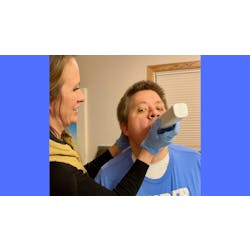...we have over 6,000 patients in our database ...(yet) the hygiene coordinator cannot keep our schedules full!
Dianne Glasscoe, RDH, BS
Dear Dianne,
I work in a practice with three doctors. There is another full-time hygienist besides me. The problem is that the hygiene coordinator cannot keep our schedules full! There are multiple no-shows and cancellations almost daily. There have been days when the hygiene scheduler tells me not to report for work the next day until 1 p.m., because there are no patients on my schedule until that time. This is definitely not good for my pocketbook!
It seems like our hygiene coordinator stays on the telephone constantly trying to contact patients. I have been told that we have over 6,000 patients in our database. Yet, our hygiene coordinator, who has been here for three years, tells us she has exhausted most of her lists.
I have a friend who works in a single dentist office with two other full-time hygienists. She tells me that their schedules are always full and that their cancellations are usually filled with another patient.
Something is definitely wrong in my office, but we cannot seem to identify the problem. Can you help us?
Wishing to Work in Washington
Dear Wishing,
Now, let me get this straight. You have a patient base of over 6,000 patients and three full-time doctors, but cannot keep two hygienists busy? This many patients should keep four full-time hygienists busy! Yes, I agree that something is wrong with this picture!
It sounds like you have a failing recall system. Although you have a staff member who is dedicated to hygiene scheduling, she obviously has not been successful. I have observed hygiene coordinators who spend the bulk of their day on the telephone trying to contact patients. These coordinators are fortunate if they actually speak with five people, since most are at work. Most of the calls result in a message being left on an answering machine that goes something like this: "Mrs. Jones, this is Mary at Dr. Black`s office. I am calling to remind you that it is time for your annual cleaning and check-up. Please call our office at 123-4567 to schedule an appointment."
Usually, these messages are simply ignored or erased by someone else in the household. One hygiene coordinator told me she consideres herself fortunate if she gets a 20 percent return rate on her calls. She also told me that her job was the most boring job in the world. What a colossal waste of time!
Several things are wrong with this message. First, some people do not like to be "reminded" of things, because it insults their intelligence. Second, the importance of the appointment is diluted by calling it a "cleaning" or a "check-up." Third, asking patients to call puts the burden on them. They will ignore the request, especially if they are having no problems.
Another popular recall technique is to send out a large batch of monthly recall cards, with patients instructed to call the office to schedule an appointment. Again, a very low (10-20 percent) rate of return calls can be expected. With this method, many patients are lost in the system and do not return at the appropriate interval. Both the practice and the patient?s oral health suffers. The most effective recall system, in my observation, is that of pre-appointing for all patients who have predictable schedules and no previous history of canceling appointments.
There are several advantages to pre-appointing:
1) The patient can choose the day of the week and time of day that suits him/her best.
2) The hygiene coordinator?s time is not wasted chasing recall patients.
3) Patients return when appropriate and do not become lost in the system.
4) Emphasis on timely continuing oral care is established.
Here are some pre-appointing guidelines:
- Block off one day per month in the hygiene schedule to be used as buffer time in case any patients have to be rescheduled.
- Plan vacations and continuing education well in advance so time can be blocked off the schedule.
- Pre-block periodontal therapy treatment time based on the number of periodontal patients seen in the past six months. Find the average by dividing the number of periodontal appointments in a given month into the number of days worked. Example: if you had 10 periodontal appointments in five days, you would need to pre-block two periodontal appointments each day.
- Do not completely fill all days when pre-appointing, but leave some openings here and there. Patients who call for an appointment will fill these openings.
- Do not pre-appoint any patient who has a history of canceling appointments or who works an unpredictable schedule.
- All patients who are pre-appointed should get a confirmation card in the mail with their appointment day and time three to four weeks before the appointment.
- All patients who are pre-appointed should be confirmed by telephone two days before the visit.
If you are just beginning a system of pre-appointing, here is a diaglogue sample:
OMrs. Jones, I?ll be happy to reserve your next preventive care (or continuing care, not cleaning) appointment while you are here. That way, you can choose the day and time that works best for you.O
For periodontal patients: OWe have come a long way, but it is extremely important to keep you on a continuing care schedule that will allow us to control the disease. Otherwise, the disease can return.O
There will be a few patients who do not wish to pre-appoint. Those people can be sent a card informing them that it is time to schedule their next preventive visit.
If your office uses computer scheduling, the pre-appointing task is simple. The system will allow you to either schedule an appointment or send a computer-generated card in six months. If you are still using an appointment book, keep the present and next month schedules at the front desk. Keep the next four months at chairside so you can make the patient?s next appointment.
Unfortunately, there are no quick fixes for a failing recall system.
However, by initiating a pre-appointment system, your OholeyO schedule should begin to fill gradually over the next twelve months. You and the other hygienist should have no problem keeping a full schedule.
Dianne
Dianne Glasscoe, RDH, BS, is an adjunct instructor in clinical hygiene at Guilford Technical Community College. She holds a bachelor`s degree in human resource management and is a practice-management consultant, writer, and speaker. She may be contacted by e-mail at [email protected], phone (336) 472-3515, or fax (336) 472-5567. Visit her Web site at http://www.professionalden talmgmt.com




